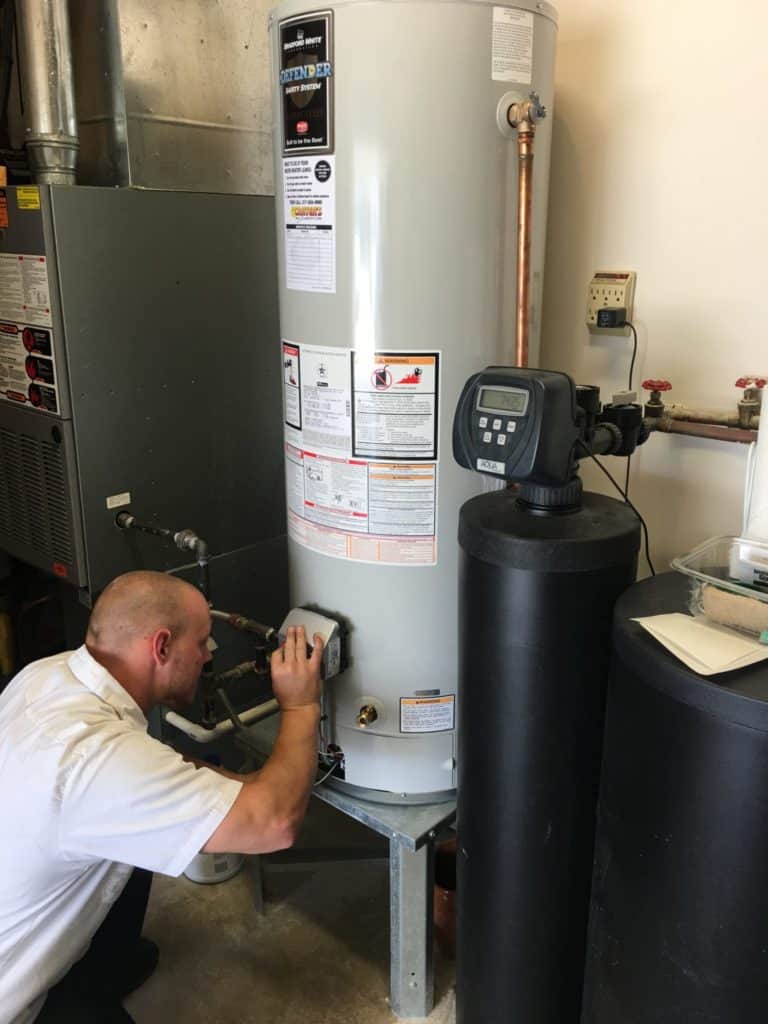Dealing with the Primary Water Heater Urgencies
Dealing with the Primary Water Heater Urgencies
Blog Article
This article down below pertaining to Is Your Water Heater Leaking? is exceedingly compelling. Give it a go and draw your own personal findings.

A water heater is one of one of the most crucial fundamental appliances that can be discovered in a home. With hot water heater, you don't require to go through the anxiety of home heating water manually each time there is a demand to wash, do the laundry, or the dishes. Nevertheless, there is constantly a possibility that your hot water heater would certainly break down just like most mechanical devices.
It is important to note any little malfunction and tackle it promptly before points leave hand. The majority of times, your water heater begins to malfunction when there is an accumulation of sediments as a result of continual usage. As a preventative measure, periodic flushing of your water heater is recommended to prevent debris accumulation as well as avoid functional failing.
Common water heater emergency situations and exactly how to deal with them
Dripping hot water heater container.
A dripping storage tank could be a sign of deterioration. It could trigger damage to the floor, wall surface and also electrical tools around it. You might even be at threat of having your home flooded. In this circumstance, you must shut off your water heater, allow it to cool down, as well as meticulously seek the source of the problem. At times, all you need to do is to tighten up a couple of screws or pipe links in cases of small leaks. Yet if this does not function and the leakage lingers, you might require to utilize the solutions of a technician for a proper replacement.
Rising and fall water temperature level.
Your water heating system might start generating water of different temperatures typically ice chilly or hot warm. There might be a requirement to change either the heating or the thermostat unit of your water heating system.
Inadequate warm water
It may be that the water heater can not sustain the hot water demand for your apartment. You might update your water heater to one with a larger capability.
Tarnished or stinky water
When this happens, you require to recognize if the concern is from the water or the container source. If there is no amusing odor when you run cold water, then you are particular that it is your water heating unit that is malfunctioning. The odiferous water can be triggered by rust or the accumulation of germs or sediments in the water heating unit storage tank.
Conclusion
Some house owners disregard little caution and also minor faults in their hot water heater device. This only leads to more damages as well as a feasible total failure of your home appliance. You ought to handle your hot water heater faults as soon as they come up to prevent even more expenses as well as unneeded emergency difficulties.
With water heating systems, you do not need to go with the anxiety of heating water manually every time there is a demand to take a bath, do the washing, or the dishes. Your water heater might begin generating water of various temperature levels generally ice cold or hot warm. It may be that the water heating system can not support the warm water need for your house. If there is no funny smell when you run cold water, then you are specific that it is your water heating unit that is damaged. The stinky water can be created by rust or the accumulation of germs or sediments in the water heating unit tank.
Common Water Heater Issues and What You Should Do
What Type of Water Heater Do You Have?
Before we begin it’s first important that you identify the type of water heater you have on your property. There are two main types of water heaters out there: conventional and high efficiency.
Both of these types of products typically use either gas or electricity to heat power. There are also solar water heaters that use a thermal collector on the roof or yard to heat the water.
While these models are not as common, they can cut heating costs in half. In this article, we will focus on conventional and high efficiency.
How Do My Electric and Gas Water Heater Work?
Though they look similar, electric and gas water heaters work very differently. It’s important to know their basic function because often problems can be specific to the heating source.
In the electric model, a thermostat on the side of the machine detects the temperature of the water in the tank. When the temperature needs to rise electricity flows to a heating element suspended in the water.
Gas models also use a thermostat device — typically with a mercury sensor at the tip and an additional sensor called a thermocouple. The thermocouple detects whether the pilot light is on and controls the flow of gas.
When the thermostat drops below the appropriate level gas is released which becomes ignited by the pilot light. The flame heats the bottom of the water tank which causes hot water to rise and cold water to drop.
This natural circulation continues until the water reaches the desired temperature. Then, the thermostat triggers the gas control valve to shut off the flow of gas.
What Are the Most Common Issues and How Do You Fix Them?
https://happyhiller.com/blog/common-water-heater-issues-and-what-you-should-do/

We are very enthusiastic about Common Hot Water Heater Problems and I'm hoping you liked the entire article. Sharing is nice. One never knows, you may be doing someone a favor. Thank you for taking the time to read it.
Trust our expertise. Report this page